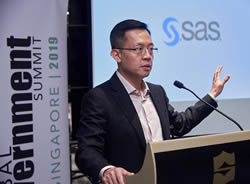SINGAPORE
 The head of Singapore’s Public Service, Leo Yip has highlighted the dangers of current global and social tensions, saying Governments have to respond to challenges around trust, technology and transformation.
The head of Singapore’s Public Service, Leo Yip has highlighted the dangers of current global and social tensions, saying Governments have to respond to challenges around trust, technology and transformation.
Speaking at the opening of the 2019 Global Government Summit, an annual event bringing together leaders of Public Services from around the world, Mr Yip (pictured) said that while delegates came from different countries, serving different Governments “we face broadly the same set of challenges”.
Thirteen top officials attended the summit, representing nine countries from the Far East, Europe, North America and Australasia.
Identifying some of the issues that really mattered to Public Service leaders globally, Mr Yip recalled that at the 2018 event he’d picked out what he’d dubbed “the four dreaded Ds — declining trust, demographic change, disillusioned electorates and disruptive technologies”.
“A year on there are three Ds that describe the world that we operate in, and manifest the challenges for many of the Civil Services around the world,” Mr Yip said.
“The first D is the dark clouds that are looming over the global economy, and which I think are becoming more evident with every passing month.”
The second D was deep divisions, first on the international stage, where the major powers were more divided than at any point in time since the end of the Cold War.
“At another level, I think we’re seeing across many countries around the world deep divisions in societies and in electorates and peoples. At the heart of this is the rise of populism and the emergence of extremist political parties,” Mr Yip said.
The third D was “the phenomenon of de-globalisation. Until recent years free trade and economic integration were seen as the keys to boosting productivity and prosperity, but growing political and economic tensions are challenging that consensus”.
To address these three Ds, he suggested the three Ts — repairing public trust, addressing public issues around fast moving technology and transforming Public Service attitudes and processes designed and put in place in a past era.
“Crucially, Civil Services must become more agile, and act in a more coherent manner,” Mr Yip said.
“To respond to ever more rapidly evolving societies, economies and technologies, they must develop an agility of policy response, of delivery and of capability. We need to build this agility, transforming the ways in which we organise ourselves and serve the public.”
Singapore, 11 September, 2019











